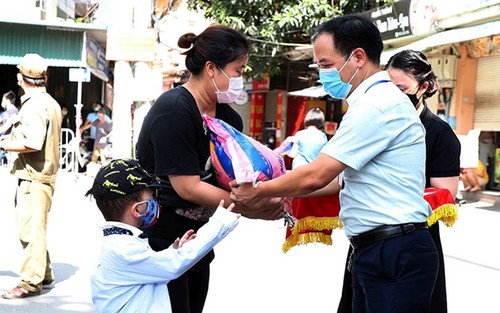 The government has implemented a number of policies to help poor people during the COVID-19 pandemic. (Photo: Minh Ha) The government has implemented a number of policies to help poor people during the COVID-19 pandemic. (Photo: Minh Ha) |
Respecting and protecting human rights are consistent policies of the Vietnamese Party and State. It is clearly stated in the Declaration of Independence and Constitution. Human rights are common values of human beings. Ensuring and promoting human rights are important factors for sustainable development.
To ensure that all Vietnamese fully enjoy human rights, the Vietnamese Party and State have built and fine-tuned the legal system. Last year Vietnam revised or approved many important laws, including the revised Law on Drug Prevention and Control and the revised Criminal Procedure Code.
The annual legislative program always ensures the enforcement of the Constitution on human rights and the fundamental rights and obligations of citizens.
Vietnam deems that ensuring freedom of expression, freedom of the press, and access to information fulfills obligations under international treaties on human rights and benefits national development.
Vietnam has one of the highest growth rates and internet usage rates in the world. Digital platforms and social networks create channels and interfaces for people to access information, exchange ideas, and express their views. By December 2021, more than 70 percent of Vietnam’s population had internet access and 72 million people used social networks, an increase of 7 million people during the year. There are 76 million Facebook accounts in Vietnam.
On August 30, 2021, the President signed a decision granting amnesty to 3,035 prisoners. This is a major policy of the Vietnamese Party and State and a fine tradition of the Vietnamese nation, which strictly judges criminals but is lenient and humane toward criminals who have corrected themselves and are striving to become useful citizens.
Amnesty decisions also affect foreign citizens on the principle of fairness and transparency to show the international community a clear view of the Vietnamese policies and strengthen relations with those countries whose citizens are granted amnesty.
During the COVID-19 pandemic in 2021, the government adopted a number of policies to stabilize people’s lives, particularly the poor. A social security package worth 2.7 billion USD and a second package worth 1.1 billion USD showed the Party and State’s determination to protect human rights.
Vietnamese media agencies have contributed opinions to draft laws, policies, and national strategies and projects. The government listens to critical comments in order to revise laws and policies in line the situation, particularly in relation to COVID-19 prevention and control and socio-economic development.
The Vietnamese government has pushed ahead with building an e-government and has increased the use of social networks as a channel to provide information to and communicate with the public.
The Facebook page "Government Information" provides timely and accurate information about the Prime Minister's directives and other administrative and social updates. It has recorded nearly 2.6 million likes and has 3 million followers.
In addition to protecting and promoting human rights inside the country, human rights diplomacy through bilateral frameworks has been conducted.
Vietnam successfully organized an annual Human Rights Dialogue with the US and Australia to provide information about Vietnam's efforts and achievements in protecting and promoting human rights to enhance mutual understanding, narrow differences, seek cooperation opportunities, and promote bilateral relations.
Vietnam maintains exchanges with partners, including the EU and the G4 (Canada, Switzerland, Norway, and New Zealand), and organizes consultative meetings on human rights with traditional friends such as Russia and China.
Vietnam’s election to the UN Human Rights Council in the 2023-2025 term reflects commitments to ensuring human rights.